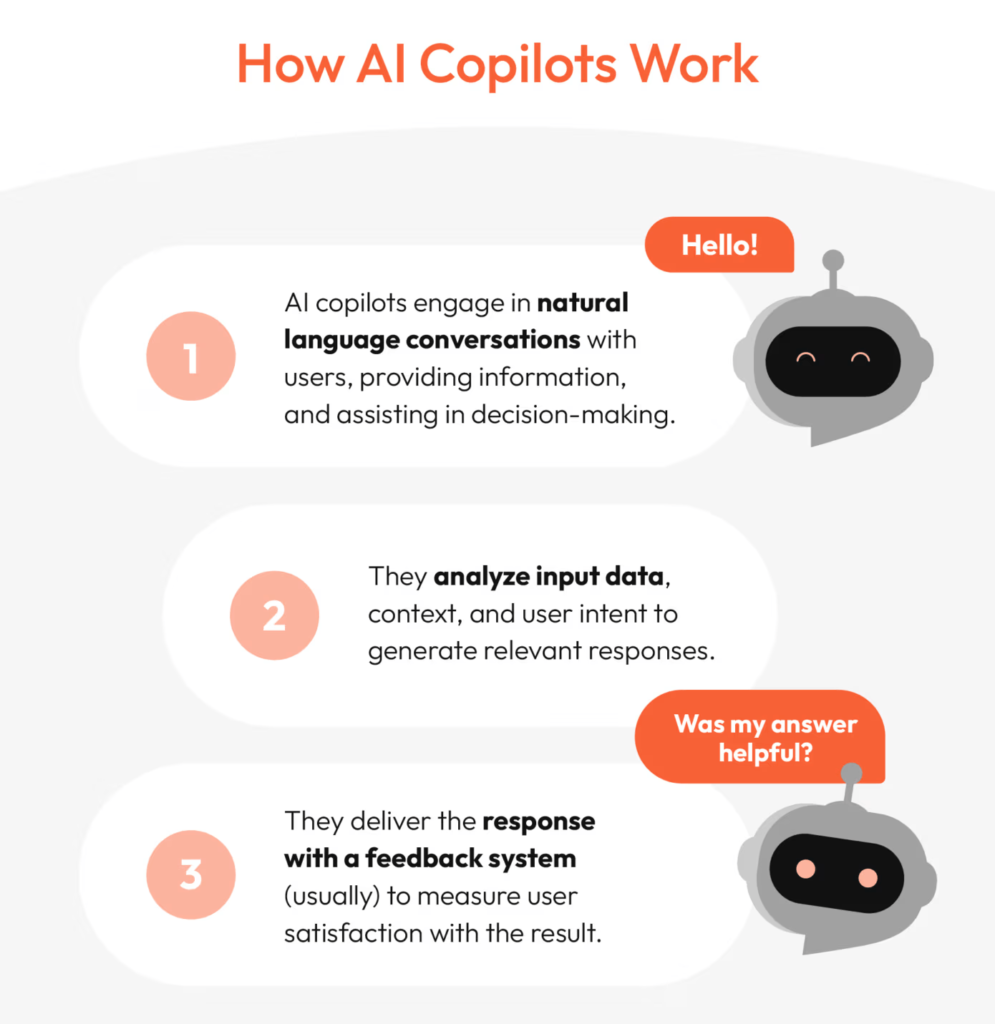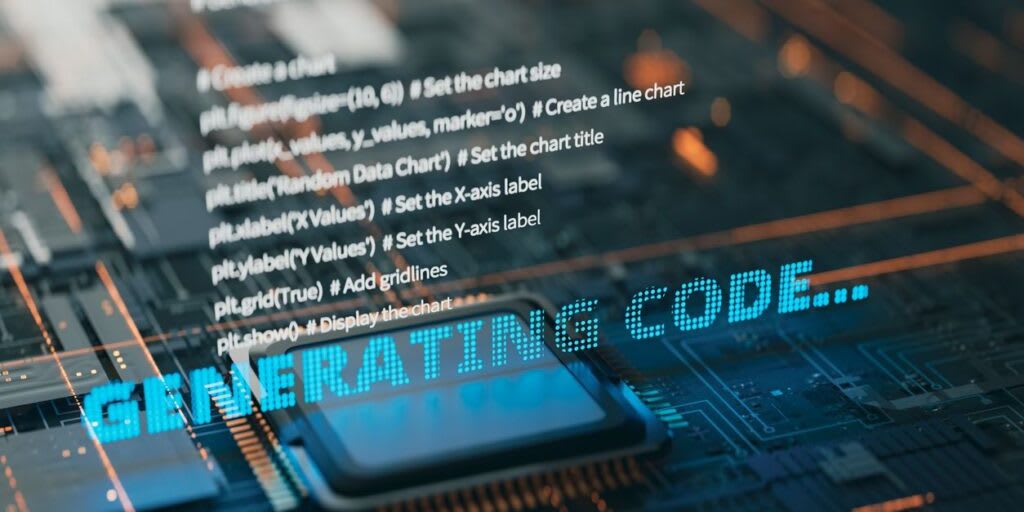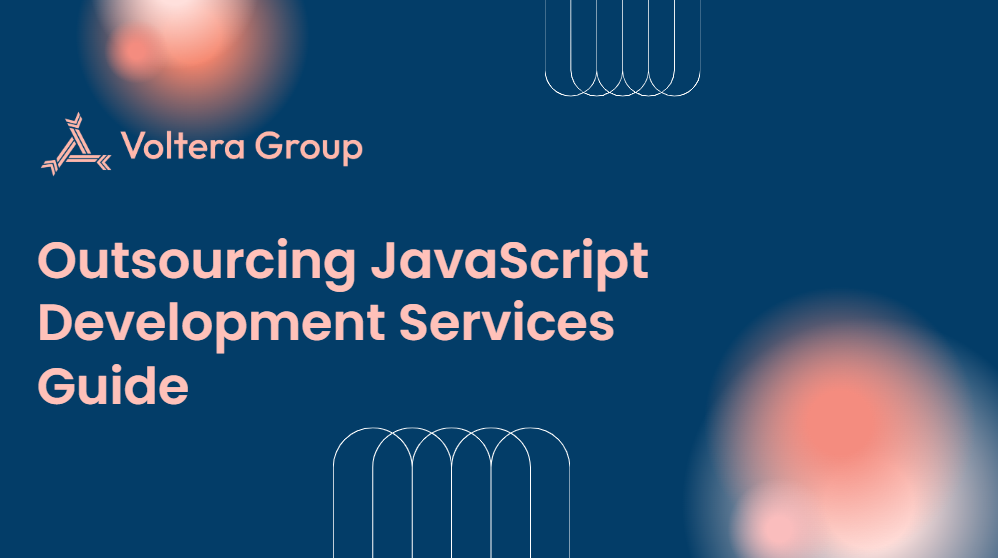At Voltera Group, we recognize that AI copilots are becoming more powerful by the day. However, their primary function is not to replace human expertise but to enhance it by supporting decision-making processes and improving efficiency. These AI systems are designed to work alongside professionals, offering valuable assistance in tasks that are growing in complexity, particularly in areas like cybersecurity, data management, and business operations.
As a key player in technological consulting, Voltera Group is at the forefront of helping businesses leverage AI copilots to achieve their goals.
The Growing Role of AI Copilots in Business
GenAI (Generative AI) is arguably the biggest technological trend today, with expanding applications across industries. One notable application is AI copilots in the workplace. A Forbes survey found that 47% of businesses are already using AI assistants, a significant shift signaling the normalization of AI copilots in the work environment. These AI copilots, powered by large language models (LLMs), process and respond to user inputs in ways that simulate human interaction, providing businesses with enhanced capabilities in decision-making and productivity.
At Voltera Group, we help organizations implement and scale AI copilots as part of their digital transformation strategies, ensuring that these technologies align with their specific goals and operational needs.

How Do AI Copilots Work?
AI copilots act as advanced digital assistants capable of augmenting or automating certain functions within an organization. They are trained on vast data sets, allowing them to make predictions, provide insights, and support a wide range of tasks. The user interface of these copilots is designed to be as intuitive as possible, ensuring that the technology is accessible even to users without technical expertise. This ease of use makes AI copilots an attractive tool for businesses looking to improve their operations.
Voltera Group specializes in integrating AI copilots into different business environments, helping organizations unlock the potential of this technology to drive efficiency, productivity, and innovation.
Types of AI Copilots and Their Use Cases
Specialized GPT Apps
For businesses new to AI integration, specialized GPT applications offer an entry point. These apps, based on Generative Pre-trained Transformer models, can be customized to handle specific tasks, providing a specialized assistant that can improve operations without extensive coding. Voltera Group assists companies in developing and deploying these tools to handle targeted tasks efficiently.
Use Case Example: AI-powered writing apps like Grammarly that assist users in editing and improving written content. At Voltera Group, we help businesses adopt similar AI applications tailored to their internal processes.
AI Chatbots
AI chatbots manage high volumes of customer queries by leveraging pre-existing documentation to provide accurate, timely responses. This reduces the workload on human staff, allowing businesses to allocate resources more effectively. Voltera Group implements chatbot solutions to improve customer service while freeing up valuable human resources.
Use Case Example: Automated customer support, where chatbots handle routine queries, leaving more complex inquiries to human agents.
AI Assistants
These assistants go beyond answering questions; they can execute tasks based on user commands. From scheduling appointments to automating workflows, AI assistants enhance productivity by handling repetitive tasks. Voltera Group provides the technical infrastructure and expertise needed to integrate AI assistants into your operations.
Use Case Example: Smart assistants like Amazon Alexa or Apple Siri, which execute user commands and automate everyday tasks.
Full AI Copilots
At the highest level of AI copilots, these systems offer comprehensive solutions by providing proactive advice, understanding complex contexts, and performing sophisticated actions. Voltera Group helps organizations design and deploy full AI copilots that serve as strategic advisors, offering real-time insights and decision-making support.
Use Case Example: GitHub Copilot, which assists developers by offering real-time coding suggestions, enabling faster and more accurate development.
Voltera Group's Role in Deploying AI Copilots
Voltera Group is committed to helping businesses navigate the evolving landscape of AI copilots. From initial concept to full implementation, we work closely with our clients to ensure that AI copilots are tailored to meet their unique operational needs. We focus on creating systems that are easy to use, yet robust enough to handle the complexities of modern business environments.
By integrating AI copilots, Voltera Group enables organizations to optimize productivity, make informed decisions, and stay competitive in a rapidly evolving technological landscape. Whether you’re looking to automate workflows, enhance customer service, or implement complex advisory systems, Voltera Group has the expertise to make AI copilots work for your business.
For those new to AI integration, specialized GPT (Generative Pre-trained Transformer) applications offer an accessible option. These applications utilize models like OpenAI’s ChatGPT to create targeted, specialized assistants without intense coding. They can be customized with specific documentation or API capabilities to handle tasks within defined contexts.
- Primary Use Case: Specialized task handling.
- Benefits: Relatively easy to set up with no-code platforms, performing specialized tasks effectively.
- Limitations: Limited by the scope of provided data, documents, and the functionalities of the APIs it utilizes. It is also limited by the product’s interface (for example, ChatGPT is bound to the interface OpenAI provides).
As a use case, look no further than apps like Grammarly or the Hemingway Editor, which are powered by AI. Writing apps like these help users edit, improve, draft, and find the right tone for a type of publication.

The AI chatbot is the entry level of AI copilots, focusing on handling support queries using preexisting documentation. This type manages a high volume of common inquiries by scanning vectorized databases of user manuals, FAQs, and other resources to furnish relevant information quickly.
- Primary Use Case: Customer support.
- Benefits: Reduces workload on human support staff by efficiently managing routine inquiries.
- Limitations: Cannot handle complex, unique, or nuanced customer requests without human intervention.
Do you remember Clippy? It was an office assistant introduced in 1996 designed to provide help and tips for using Microsoft Office tools. Chatbots have evolved significantly since then. Today, they are extensively used for online customer support, offering information and guidance around the clock. Modern implementations use vector databases and semantic search technologies to fetch and return information to the user.
The AI assistant not only provides information but can also execute actions based on user commands. This type of copilot integrates with real-time APIs and databases to perform tasks such as scheduling appointments, controlling smart devices, or initiating workflows.
- Primary Use Case: Task execution and workflow automation.
- Benefits: Enhances productivity by automating routine tasks and integrating with various tools and platforms.
- Limitations: Dependent on the readiness and compatibility of APIs for seamless operation, with capabilities confined to the defined API scope.
Most smartphone AI assistants fall into this category. Ask Gemini Beta or Siri for a timer; they will call the application API and run it automatically. Similarly, if you ask Alexa to order a product, she will handle the entire process.
While the terms “AI assistant” and “AI copilot” are sometimes used interchangeably, there is a subtle distinction. AI copilots are typically more collaborative, actively helping users accomplish specialized tasks. Nonetheless, they coexist in the universe of GenAI copilots.
The AI copilot offers a comprehensive solution, serving not just as a reactive tool but as a proactive advisor. It understands context, anticipates user needs, and provides tailored advice alongside performing actions. This type requires deep integration with internal and external data platforms, sophisticated API interactions, and possibly the development of specialized ML models.
- Primary Use Case: Advisory, complex decision-making, and comprehensive action delivery.
- Benefits: Offers strategic insights and predictive assistance, adapting to complex user needs and enhancing decision-making processes.
- Limitations: Significant development time and resources are required to achieve full functionality, including the potential need for custom AI model training.
GitHub Copilot is the prime example here, running on your integrated development environment (IDE). It evaluates the developer’s code and provides advice as soon as it notices a pattern. Developers have considered this type of tool a game-changer, reporting 55% faster task completion.

These categories of AI copilots, each suited for different tasks, find practical employment in various scenarios, as demonstrated by the following use cases.





